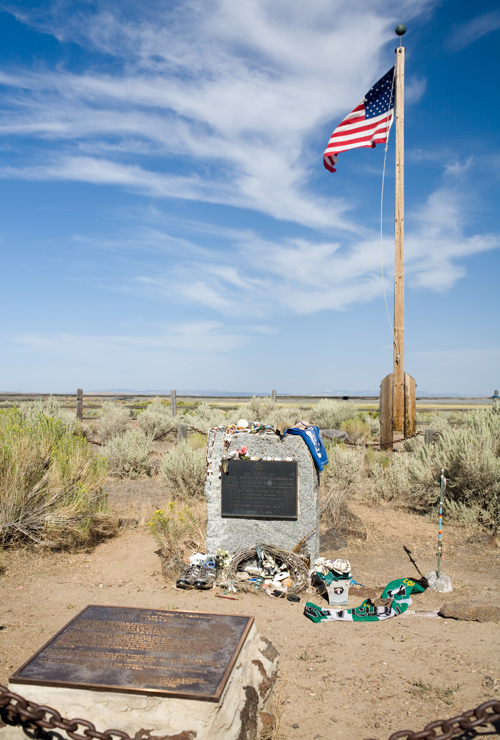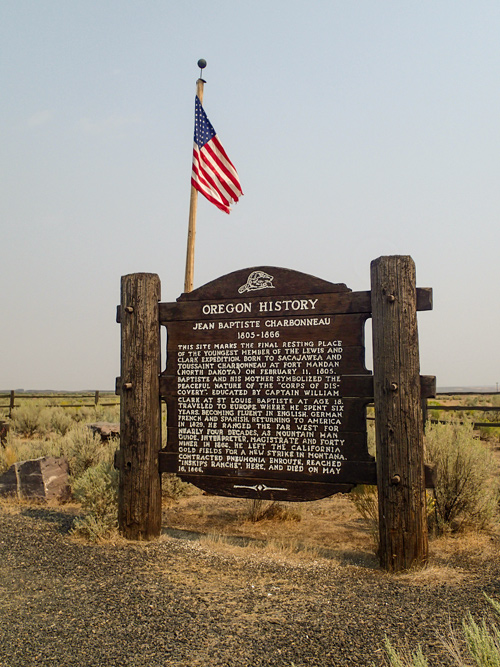Obituary
Jean Baptiste Charbonneau Gravesite, Donner Oregon
By WikiCommons user Javedgerton. Permission to use granted under the Creative Commons Attribution-ShareAlike 3.0 Unported license.
Text on tombstone:
1805 – 1866
Jean Baptiste Charbonneau
As a baby was with his mother Sacajawea a member of the Lewis and Clark Expedition.
As a man was a pioneer of the west, of pleasant manner, and esteem in the community
Placed by Malheur Chapter D.A.R., August 6, 1974
We last hear of Jean Baptiste Charbonneau in 1866—now a western traveler bound for the Montana Frontier. Many believe his was seeking gold, but maybe California was getting too crowded, or maybe he simply wanted to see the mountains and prairies of his younger mountain man years. After crossing a swollen and cold Owyhee River—we don’t know if he was in the stagecoach, on horseback, or on foot—he took a chill and later died several miles away at Inskeep Station. He likely died from pneumonia.
The Placer Herald obituary, despite some significant historical inaccuracies, is worth repeating here in full:
The Placer Herald
Auburn, July 7, 1866
Death of a California Pioneer. — We are informed by Mr. Dana Perkins, that he has received a letter announcing the death of J. B. Charbonneau, who left this county some weeks ago, with two companions, for Montana Territory. The letter is from one of the party, who says Mr. C., was taken sick with mountain fever, on the Owyhee, and died after a short illness.
Mr. Charbonneau was known to most of the pioneer citizens of this region of country, being himself one of the first adventurers (into the territory now known as Placer county) upon the discovery of gold; where he has remained with little intermission until his recent departure for the new gold field, Montana, which, strangely enough, was the land of his birth, whither he was returning in the evening of life, to spend the few remaining days that he felt was in store for him.
Mr. Charbonneau was born in the western wilds, and grew up a hunter, trapper, and pioneer, among that class of men of which Bridger, Beckwourth, and other noted trampers of the woods were the representatives. He was born in the country of the Crow Indians—his father being a Canadian Frenchman, and his mother a half breed of the Crow tribe. He had, however, better opportunities than most of the rough spirits, who followed the calling of trapper, as when a young man he went to Europe and spent several years, where he learned to speak, as well as write several languages. At the breaking out of the Mexican war he was on the frontiers, and upon the organization of the Mormon battalion he was engaged as a guide and came with them to California. Subsequently upon the discovery of gold, he, in company with Jim Beckworth, came upon the North Fork of the American river, and for a time it is said were mining partners.
Our acquaintance with Charbonneau dates back to ’52, when we found him a resident of this county, where he has continued to reside almost continuously since— having given up frontier life. The reported discoveries of gold in Montana, and the rapid peopleing of the Territory, excited the imagination of the old trapper, and he determined to return to the scenes of his youth.— Though strong of purpose, the weight of years was too much for the hardships of the trip undertaken, and he now sleeps alone by the bright waters of the Owyhee.
Our information is very meager of the history of the deceased—a fact we much regret, as he was of a class that for years lived among stirring and eventful scenes.
The old man, on departing for Montana gave us a call, and said he was going to leave California, probably for good, as he was about returning to familiar scenes. We felt then as if we met him for the last time.
Mr. Charbonneau was of pleasant manners, intelligent, well read in the topics of the day, and was generally esteemed in the community in which he lived, as a good meaning and inoffensive man.[1]The Placer Herald, 07 July 1866, Chronicling America: Historic American Newspapers. Lib. of Congress, chroniclingamerica.loc.gov/lccn/sn82014998/1866-07-07/ed-1/seq-2/.
Inskeep Station Interpretive Sign
Interpretive Sign, Donner, Oregon
© 2013 Jeffrey G. Backes. Permission to use granted under the Creative Commons Attribution-ShareAlike 3.0 Unported license.
The interpretive sign at Jean Baptiste’s grave site helps clarify some of the facts found in the above obituary:
Oregon History
Jean Baptiste Charbonneau
1805–1866
This site marks the final resting place of the youngest member of the Lewis and Clark expedition. Born to Sacajawea and Toussaint Charbonneau at Fort Mandan (North Dakota) on February 11, 1805. Baptiste and his mother symbolized the peaceful nature of the “Corps of Discovery.” Educated by Captain William Clark at St. Louis, Baptiste at age 18, traveled to Europe where he spent six years, becoming fluent in English, German, French, and Spanish. Returning to America in 1829, he ranged the Far West for nearly four decades, as a mountain man, guide, interpreter, magistrate and forty niner. In 1866, he left the California gold fields for a new strike in Montana, contracted pneumonia enroute, reached “Inskip’s Ranche”, here, and died on May 16, 1866.
Further Reading
- W. Dale Nelson, Interpreters with Lewis and Clark: The Story of Sacagawea and Toussaint Charbonneau (Denton, Texas: University of North Texas Press, 2003)
- Susan M. Colby, Sacagawea’s Child: The Life and Times of Jean-Baptiste Charbonneau (Spokane, Washington: The Arthur H. Clark Company, 2005).
- HannaLore Hein, “The Final Journey of Jean Baptiste Charbonneau,” We Proceeded On 49, no. 3 (August 2023): 31–41.
Notes
| ↑1 | The Placer Herald, 07 July 1866, Chronicling America: Historic American Newspapers. Lib. of Congress, chroniclingamerica.loc.gov/lccn/sn82014998/1866-07-07/ed-1/seq-2/. |
|---|
Experience the Lewis and Clark Trail
The Lewis and Clark Trail Experience—our sister site at lewisandclark.travel—connects the world to people and places on the Lewis and Clark Trail.
Discover More
- The Lewis and Clark Expedition: Day by Day by Gary E. Moulton (University of Nebraska Press, 2018). The story in prose, 14 May 1804–23 September 1806.
- The Lewis and Clark Journals: An American Epic of Discovery (abridged) by Gary E. Moulton (University of Nebraska Press, 2003). Selected journal excerpts, 14 May 1804–23 September 1806.
- The Lewis and Clark Journals. by Gary E. Moulton (University of Nebraska Press, 1983–2001). The complete story in 13 volumes.



